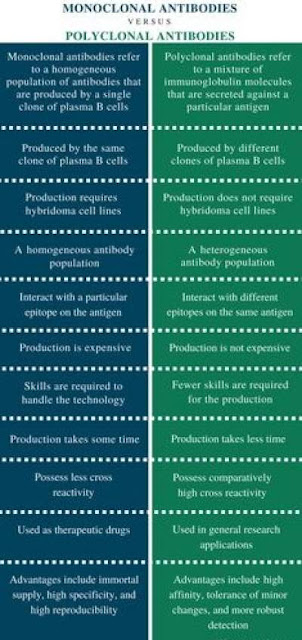The difference between polyclonal and monoclonal antibodies
The key differences between polyclonal and monoclonal antibodies and their respective advantages and disadvantages.
Polyclonal antibody
Low cost of preparation. High cost of preparation
Preparation skills are not demanding and require special training before applying technology
Faster preparation speed requires longer time to prepare hybridoma cells
Produce large amounts of non-specific antibodies Produce large amounts of specific antibodies
Recognize multiple epitopes on any antigen
Recognize only a single epitope on an antigen
There may be differences between batches. The prepared hybridoma cells are a source of continuous and reproducible monoclonal antibodies
No differences or small differences between batches.
Polyclonal antibody Features:
Identify multiple epitopes on any antigen. The resulting serum is a heterogeneous antibody mixture with different affinity.
Polyclonal antibodies are mainly composed of IgG subclasses.
Polyclonal antibodies that target unique epitopes are usually prepared using polypeptide immunogens, especially against highly homologous protein families.
Antibody preparation:
The preparation cost is low and the preparation speed is fast.
The preparation process is simpler than monoclonal antibodies.
Advantages of Polyclonal antibodies:
Polyclonal antibodies can recognize multiple epitopes on any antigen, so they have the following advantages:
High affinity:
Because multiple epitopes on the target protein can bind more than one antibody
molecule, polyclonal antibodies can amplify the signal of the target protein at
low expression levels.
However, this will affect the accuracy of the results of quantitative experiments (such as flow cytometry experiments).
It can recognize multiple epitopes, which is conducive to better results in immunoprecipitation (IP) and chromatin immunoprecipitation (ChIP) experiments.
Compared with monoclonal antibodies, they are more tolerant of minor antigen changes (such as polymorphism, glycosylation heterogeneity, or slight denaturation).
It can identify proteins with high homology to immunogenic proteins, and can also be used to screen non-immunogenic species for target proteins.
Usually the first choice for detecting denatured proteins.
Multi-epitope usually improves the stability of detection.
Disadvantages Polyclonal antibodies:
Easy to produce differences between batches.
The production of large amounts of non-specific antibodies may produce background signals in certain applications.
With multiple epitopes, it is important to detect the cross-reactivity of immunogen sequences.
It is not suitable for detecting specific domains of antigens, because antisera usually recognize multiple domains.
Monoclonal antibodies Features:
It is not easy to produce differences between batches.
Consists of only one antibody subtype (eg IgG1, IgG2, IgG3). If secondary antibodies are required for detection, antibodies should be selected for the correct subclass.
Learn more about Abcam's rabbit monoclonal technology and its advantages.
Antibody preparation:
The technical requirements are higher.
Special training is required before applying technology.
It takes a long time to prepare hybridoma cells.
Advantages of Polyclonal antibodies:
The prepared hybridoma cells are a continuous and reproducible source of monoclonal antibodies, and all batches are the same, which helps to improve the consistency and standardization of the experimental process and experimental results.
Monoclonal antibodies only detect one epitope on each antigen, so they have the following advantages:
Section and cell staining produce less background signal. To detect a target epitope specifically, it is not easy to cross-react with other proteins.
Due to their high specificity, monoclonal antibodies are very suitable for use as primary antibodies in experiments, and they typically produce a background staining signal that is significantly lower than polyclonal antibodies.
Compared with polyclonal antibodies, the homogeneity of monoclonal antibodies is very high. Under the same experimental conditions, the reproducibility of results between monoclonal antibody experiments is very high.
Thanks to its high specificity, monoclonal antibodies can bind antigens very efficiently in a mixture of related molecules (for example, during affinity purification).
Disadvantages of Polyclonal antibodies:
The specificity is too high for cross-species detection.
Compared with polyclonal antibodies, it is more susceptible to the loss of epitopes caused by chemical treatment. This can be compensated by combining two or more monoclonal antibodies with the same target antigen (for example, using an antibody combination kit).
Author's Bio
Education: MBBS, MD
Occupation: Medical Doctor
Specialization: Community Medicine, General Surgery, Natural Treatment
Experience: 18 Years as a Medical Practitioner
[[SHARE in Public Health Interest>>



Comments
Post a Comment